The IoT Processor Market is estimated to be valued at USD 55.6 billion in 2025 and is projected to reach USD 110.6 billion by 2035, registering a compound annual growth rate (CAGR) of 7.1% over the forecast period.
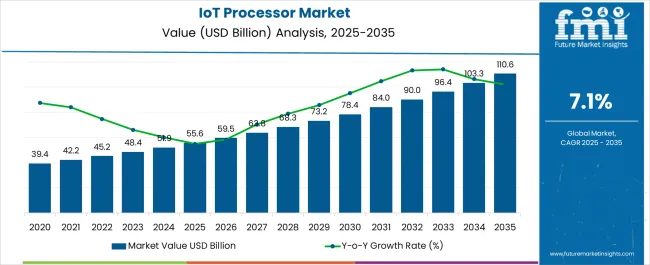
| Metric | Value |
|---|---|
| IoT Processor Market Estimated Value in (2025 E) | USD 55.6 billion |
| IoT Processor Market Forecast Value in (2035 F) | USD 110.6 billion |
| Forecast CAGR (2025 to 2035) | 7.1% |
The IoT processor market is expanding rapidly, supported by the proliferation of connected devices, rising demand for edge computing capabilities, and integration of artificial intelligence at the device level. Industry journals and technology company reports have highlighted that IoT processors are increasingly being designed to deliver enhanced energy efficiency, secure data processing, and real-time analytics. The growing adoption of IoT in industrial automation, consumer electronics, automotive, and healthcare has created a broad base of demand for processors optimized for low power consumption and seamless connectivity.
Additionally, semiconductor companies have invested heavily in research and development, leading to advanced system-on-chip (SoC) solutions with integrated wireless modules. Press releases from leading chip manufacturers indicate a strong focus on security enhancements to protect IoT ecosystems from cyber threats.
Looking forward, the market is expected to benefit from 5G-enabled IoT applications, smart city initiatives, and automotive digitalization. Growth will be primarily supported by the dominance of 32-bit processors, which balance performance and efficiency, and by the automotive sector, which is adopting IoT at scale for advanced driver-assistance systems (ADAS) and vehicle connectivity.
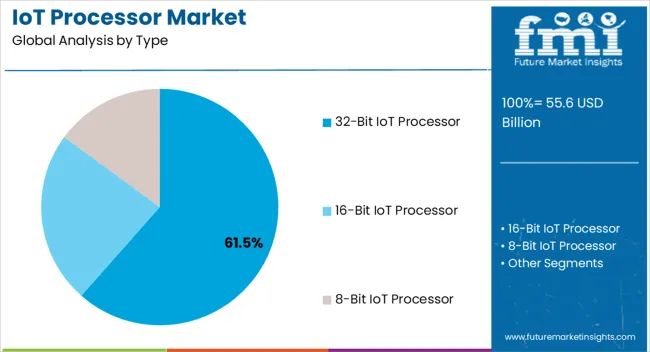
The 32-Bit IoT Processor segment is projected to account for 61.5% of the IoT processor market revenue in 2025, maintaining its leadership position due to its balanced performance and energy efficiency. This segment’s growth has been reinforced by its suitability for a wide range of IoT applications, from consumer wearables to industrial sensors, where moderate computational power is sufficient.
Industry reports have emphasized that 32-bit processors offer an optimal trade-off between processing capability, power consumption, and cost, making them the preferred choice for manufacturers seeking scalability. Furthermore, the availability of extensive software ecosystems and development tools has simplified product integration and accelerated time-to-market for IoT devices built on 32-bit architectures.
The segment has also benefited from increasing demand in edge computing, where localized data processing reduces latency and enhances system reliability. As IoT deployments scale globally, the 32-Bit IoT Processor segment is expected to continue dominating due to its versatility and affordability.
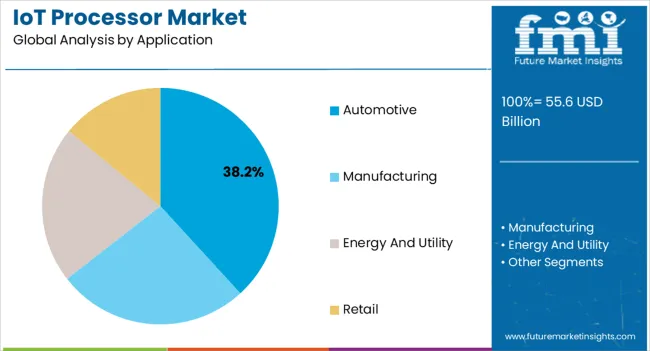
The Automotive segment is projected to contribute 38.2% of the IoT processor market revenue in 2025, emerging as the leading application segment. This growth has been supported by the rising integration of IoT-enabled processors in advanced driver-assistance systems, infotainment, telematics, and predictive maintenance applications.
Automotive manufacturers have prioritized IoT processors for their ability to handle real-time data processing, enabling safer and more efficient vehicle operations. Industry announcements and automotive electronics reports have noted that IoT processors enhance vehicle connectivity by enabling seamless communication between sensors, control units, and external networks.
Additionally, regulatory emphasis on road safety and emissions control has accelerated the deployment of IoT processors in next-generation vehicles. The shift toward electric and autonomous vehicles has further strengthened this segment, as processors are required to manage complex workloads with high reliability. With automakers increasingly investing in smart mobility solutions, the Automotive segment is expected to maintain its dominant role in IoT processor adoption.
As more devices become associated daily, carrier suppliers are finding it challenging to collect, process, and dispatch data from one device to another due to general-purpose sensor conformance limitations. This leads to a distinct necessity for IoT processors. For example, IoT processors in wearable devices control sense, process, store, and interpret data while ingesting very little power.
This would not have been possible if wearable device distributors such as Apple Inc. and Xiaomi used general-purpose processors in their equipment. Furthermore, technological developments in cognitive and affective computing are accelerating the expansion of the IoT Processor market.
Despite the substantial opportunities offered by the IoT market for processor industry players, some processor manufacturers have been hesitant to make significant investments in this sector.
The primary issue is that IoT products tend to appeal to a niche market and generate remarkably low sales volume. However, more semiconductor companies will make investments in the IoT processor market in the coming years.
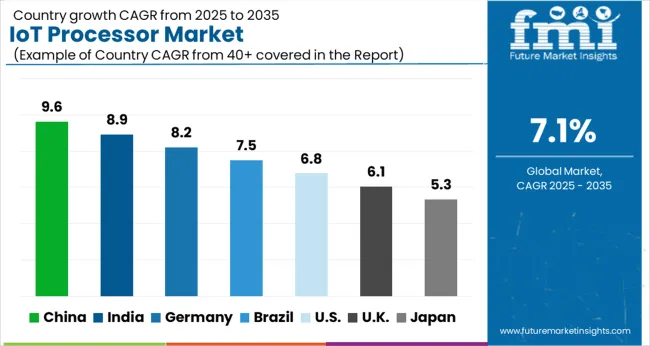
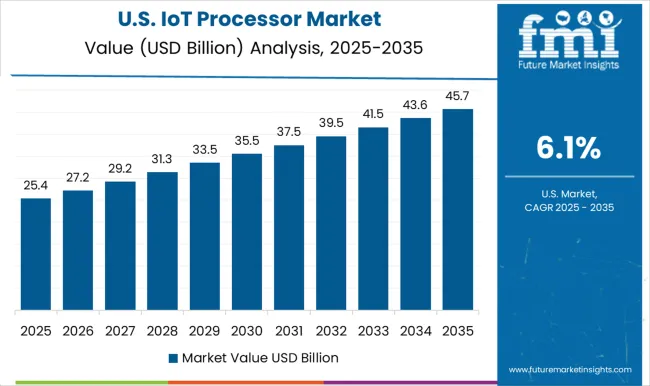
North America is anticipated to be the world's leading market for IoT processors. The vast bulk of IoT processor vendors, such as Intel and Texas Instruments, are headquartered in America and investing in the local market's IoT ecosystem. For example, BMW Group, Intel, and Mobileye collaborated on autonomous driving. North America is predicted to occupy a 40.1% market share of the global IoT processor market in 2025.
Furthermore, due to the proliferation of cloud platforms and rising R&D investments, the Internet of Things processors market is witnessing widespread adoption in the region. According to GSMA intelligence's October 2024 report in North America, the overall number of IoT connections is expected to reach 55.6 billion by 2025. In 2024, the total number of connected devices in the province was 2.9 billion.
Nations such as China and Taiwan have a massive pool of semiconductor manufacturers. With this, the Asia-Pacific region is predicted to have a moderate growth rate for the IoT Processor market. Additionally, due to the increasing projects for smart cities and rising approaches, such as Smart Wellington (New Zealand), Intelligent Disease Prediction Project (China), and cloud spending in the region, Asia Pacific is expected to exhibit the highest CAGR during the forecast years.
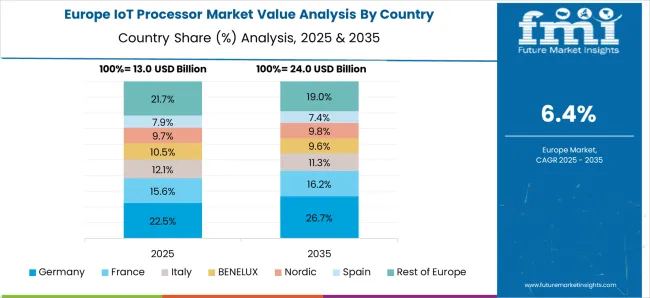
Europe is expected to surpass North America in terms of market share. The region is becoming inherently tied to large databases because healthcare is expected to compensate for a sizable market share in Europe. Diagnostic analytics, descriptive analytics, prescriptive modeling, and actionable insights can all be provided by IoT technology in combination with big data analytics.
In Europe, network adapters combined with big data are expected to gain traction. Furthermore, due to the region's growing demand for IIoT technology, Germany, the United Kingdom, France, Italy, Spain, and the Netherlands are driving the region's adoption of this market. Similarly, sophisticated technology is being adopted at a rapid pace in Eastern Europe and Nordic countries. Europe is poised to account for a market share of 23.6% of the global IoT processor market in 2025.
The 8-bit IoT Processor has a lot so much architectural variation. It is a widely used, well-understood 8-bit architecture that remains prevalent among embedded developers. As a result, the 8-bit IoT Processor segment is expected to grow significantly.
The 32-bit IoT processors are anticipated to gain promising growth during the forecast period. 32-bit processors mix performance and power economy, making them suitable for various IoT applications. Compared to lower-bit processors, these processors are able to handle more complicated jobs, multitask, and execute more sophisticated software. Additionally, they are capable of handling bigger data amounts, communication protocols, and security features effectively.
With connectivity and smart devices becoming mainstream in automobiles, automakers are upgrading their offerings with a suite of technologies such as the Internet of Things (IoT). According to BI Intelligence, connected cars likely developed USD 8.1 trillion between 2020 and 2024. According to these figures, IoT and related digitalization advancements will induce a fundamental transformation in the world of mobility. As a result, the automotive segment is expected to expand faster.
Vehicles are becoming sophisticated platforms that are connected through the incorporation of IoT processors into automotive applications. The demand for IoT processors in the automotive industry is continuing to rise as customers want more intelligent, safe, and convenient driving experiences.
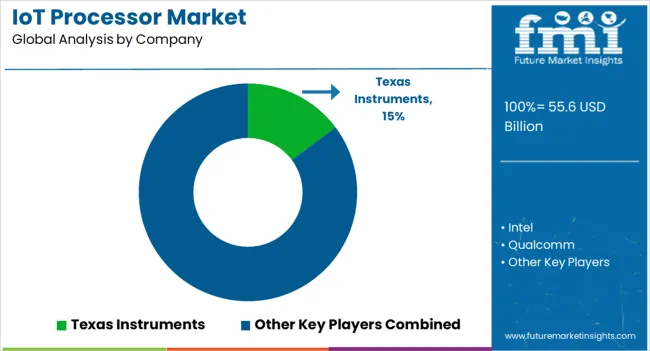
Key Players in the Start-Up Ecosystem to Open Frontiers for Future Growth
Manufacturers are adopting various marketing strategies such as new product launches, geographical expansion, mergers and acquisitions, partnerships, and collaboration to identify the interest of potential buyers and create a larger customer base. For instance,
Leading Players and Their Contributions to the IoT Processor Market
Some of the leading IoT processor manufacturers include Intel Corporation, QUALCOMM, Samsung, Lenovo, and ARM. These key IoT Processor providers are adopting various strategies, such as new product launches and approvals, partnerships, collaborations, acquisitions, mergers, etc., to increase their sales and gain a competitive edge in the global IoT Processor market. For instance,
| Attribute | Details |
|---|---|
| Market Size Value in 2025 | USD 55.6 billion |
| Market Forecast Value in 2035 | USD 110.6 billion |
| Global Growth Rate | 7.1% CAGR |
| Forecast Period | 2025 to 2035 |
| Historical Data Available for | 2020 to 2025 |
| Market Analysis | USD million for Value |
| Key Regions Covered | North America; Latin America; Europe; South Asia; East Asia; Oceania; Middle East & Africa |
| Key Countries Covered | United States, Canada, Brazil, Mexico, Germany, France, Italy, Spain, United Kingdom, China, Japan, South Korea, India, Thailand, Malaysia, Singapore, Australia, New Zealand, GCC, South Africa, Israel |
| Key Market Segments Covered | Type, Application, Region |
| Key Companies Profiled | Texas Instruments; Intel; Qualcomm; ARM; Atmel; Freescale; Amulet Technologies; Broadcom Inc.; 4D Systems; Renesas Electronics |
| Pricing | Available upon Request |
The global IoT processor market is estimated to be valued at USD 55.6 billion in 2025.
The market size for the IoT processor market is projected to reach USD 111.1 billion by 2035.
The IoT processor market is expected to grow at a 7.2% CAGR between 2025 and 2035.
The key product types in IoT processor market are 32-bit IoT processor, 16-bit IoT processor and 8-bit IoT processor.
In terms of application, automotive segment to command 38.2% share in the IoT processor market in 2025.






Full Research Suite comprises of:
Market outlook & trends analysis
Interviews & case studies
Strategic recommendations
Vendor profiles & capabilities analysis
5-year forecasts
8 regions and 60+ country-level data splits
Market segment data splits
12 months of continuous data updates
DELIVERED AS:
PDF EXCEL ONLINE
IoT Spend by Logistics Market Size and Share Forecast Outlook 2025 to 2035
IoT Chip Market Size and Share Forecast Outlook 2025 to 2035
IoT Device Management Market Size and Share Forecast Outlook 2025 to 2035
IoT Application Enablement Market Size and Share Forecast Outlook 2025 to 2035
IoT In Aviation Market Size and Share Forecast Outlook 2025 to 2035
IoT in Manufacturing Market Size and Share Forecast Outlook 2025 to 2035
IoT For Cold Chain Monitoring Market Size and Share Forecast Outlook 2025 to 2035
IoT Application Development Services Market Size and Share Forecast Outlook 2025 to 2035
IoT Connectivity Management Platform Market Size and Share Forecast Outlook 2025 to 2035
IoT-based Asset Tracking and Monitoring Market Size and Share Forecast Outlook 2025 to 2035
IoT In Construction Market Size and Share Forecast Outlook 2025 to 2035
IoT Device Management Platform Market Size and Share Forecast Outlook 2025 to 2035
IoT Testing Equipment Market Size and Share Forecast Outlook 2025 to 2035
IoT Development Kit Market Size and Share Forecast Outlook 2025 to 2035
IoT in Utilities Market Size and Share Forecast Outlook 2025 to 2035
IoT in Product Development Market Analysis - Growth & Forecast 2025 to 2035
IoT Communication Protocol Market - Insights & Industry Trends 2025 to 2035
IoT in Healthcare Market Insights - Trends & Forecast 2025 to 2035
IoT Network Management Market – Growth & Forecast through 2034
IoT for Public Safety Market

Thank you!
You will receive an email from our Business Development Manager. Please be sure to check your SPAM/JUNK folder too.
Chat With
MaRIA